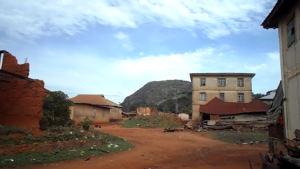Ogún jẹ́ gbogbo ohun ìní ti bàbá tàbi ìyá bá fi silẹ́ ti wọn bá kú. Ni ìgbà àtijọ́, kò wọ́pọ̀ ki olóògbé ṣe ìwé-ìhágún, bi wọn ṣe má a pín ohun ini wọn lẹhin ikú. Ọ̀pọ̀lọpọ̀ obìnrin ki i ni ọrọ̀ bi ti àwọn ọkùnrin nitori wọn ki i ni ogún bi ilé, ilẹ̀ tàbi oko. Bi wọn ba ti fẹ ọkọ pàtàki bi ẹbi bá ti gba nkan orí ìyàwó, wọn kò tún lè padà wá gba ilé, ilẹ̀ tàbi oko ni ilé bàbá wọn, nitori eyi, ọ̀pọ̀lọpọ̀ obìnrin kò ni ohun ini púpọ̀. Ọkùnrin ló ni oko, ilé àti ilẹ̀ gẹ́gẹ́ bi àṣà àdáyé ba nitori àwọn ni ‘’Àrólé’’ ti ó njẹ́ orúkọ ìdílé.
Àwọn obìnrin Yorùbá bi Ìyá Tinubu, Ẹfúnṣetán Iyalode Ìbàdàn, Ìyá Tẹ́júoṣó, mọ nipa iṣẹ́ òwò púpọ̀ àti pé láyé òde òni àwọn obìnrin ti bẹ̀rẹ̀ si kàwé lati lè ṣe iṣẹ ti àwọn ọkùnrin nṣe tẹ́lẹ̀. Nitori eyi, lati ọ̀pọ̀lọpọ̀ ọdún sẹhin, àwọn obìnrin Yorùbá ti bẹ̀rẹ̀ si ni ohun ini bi ilé, ilẹ̀, owó tàbi oko ti ọmọ lè jogún.
Lẹhin ikú bàbá tàbi ìyá, lai si ìwé-ìhágún, àwọn ẹbí ni àṣà àdáyébá ti wọn fi le pín ogún fún àwọn ọmọ olóògbé. Àwọn ẹbí miran lè lo ‘’orí ò jorí’’ tàbi idi-igi (oye ìyàwó) ti ó bá jẹ ogún bàbá. Ọ̀rọ̀ Yorùbá ni “Bàbá gbogbo ayé”, nitori ọ̀pọ̀lọpọ̀ bàbá lo ni iyawo púpọ̀. Ìdí ti ogún bàbá ṣe lè mú ìnira wá ni wi pé ohun ti wọn bá pín fún idi-igi kan lè fa owú jijẹ fún idi-igi miran eyi si ma a ndá ìjà silẹ̀ lẹhin ikú bàbá. Eyi pẹ̀lú idi ti ọ̀pọ̀lọpọ̀ ọmọ ki i náání ohun ini bàbá lẹhin ikú irú bàbá bẹ́ ẹ̀. Ìgbà miran idi-igi ti o jogún ilé, lè má lè tọ́jú rẹ titi yio fi wó.

Àwọn ilé ti wọn kò tọ́jú – Abandoned houses
Ogún ìyá ko ti bẹ̀rẹ̀ si fa ìjà bi ti bàbá. Ó lè jẹ́ wi pé nitori àwọn obìnrin ti o ni ogún ti wọn lè jà lé kò ti pọ̀ tó bi ti àwọn ọkùnrin ti o ni ìyàwó àti ohun ìní rẹpẹtẹ. Yoruba ni ‘Ọmọ ti a kò kọ́ ló ngbé ilé ti a bá kọ́ tà’. Ọmọ ti ó bá njà du ogún ma nba ogún jẹ ni. Lati din rògbòdiyàn ti ogún ma nfà, ó yẹ ki bàbá tàbi ìyá ṣe ìwé-ìhágún, ki wọn fún ọmọ ni ẹ̀kọ́ ilé àti ẹ̀kọ́ ilé-iwé ti ọmọ kò ni fi jà du ogún bàbá tàbi ti ìyá.
ENGLISH TRANSLATION
Inheritance is the property and personal possession left behind after the death of a father or mother. In the olden days, leaving a will by the deceased was uncommon. Most women were not as wealthy as the men as they seldom had houses, landed property or farmland. Once a woman is married, particularly if the family has collected bride price during traditional marriage, she is not expected to return to her father’s house to claim his house, land or the farm, hence women did not have much assets. According to old culture, men owned the farm, the house and family land because they were regarded as the “Heir” that carries on the family name.
Yoruba women such as Madam Tinubu, Madam Efusetan Ibadan Women Leader, Madam Tejuoso, were shrewd in business and nowadays, women are beginning to be as educated as their male counterpart, hence they can engage in economic activities that were formerly exclusive to men. As a result, for several years now, Yoruba women now have landed property, houses and money and farmland that can be inherited.
After the death of a father or mother, without a “Will” the family had a tradition that is followed in dividing inheritance for the children of the deceased. Some family may divide father’s inheritance using “per head count” or “per wife”. According to Yoruba adage “A Father is of the world”, since many fathers engage in polygamy. One of the reasons why inheritance from fathers could be problematic is that one of the wives could be envious of the inheritance of the other. This could be part of the reasons why many of the properties are left to decay after their father’s demise. Sometimes, the ‘per wife’ that inherited the property may not be able to maintain such inheritance leading to collapse of such house.
Fight over inheritance from mothers is not as common as that of inheritance from fathers, probably because women are not as wealthy as men who have many wives. Yoruba adage said “A child that is not trained would end up selling the house that is built”. A child that is fighting over inheritance would end up squandering such inheritance. In order to minimize the problem associated with inheritance, fathers and mothers should make a will, equip their children with both home and institutional education to reduce the fight over inheritance from father or mother.
Originally posted 2017-10-27 10:54:25. Republished by Blog Post Promoter


